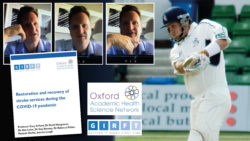 Former England cricketer Rob Key was a surprise guest on a national webinar for stroke teams, offering a patient’s perspective on receiving care at the height of the Covid-19 pandemic.
Former England cricketer Rob Key was a surprise guest on a national webinar for stroke teams, offering a patient’s perspective on receiving care at the height of the Covid-19 pandemic.
The one-time Kent and England batsman, who is now a familiar face to viewers of Sky’s cricket coverage, suffered an ischaemic stroke in May and was cared for by the team at Kent and Canterbury Hospital.
Taking a break from commentating on the second Test between England and the West Indies, he told the webinar audience of his anxiety over going into hospital at the height of the pandemic, but how the empathy of the staff shone through their personal protection equipment (PPE). He added that the biggest challenge had been not being able to see his wife and children.
“Having nurses and doctors wearing the masks wasn’t a problem for me because that’s what I expected,” he said. “And they are constantly reassuring you … you realise they are wearing it for you as much as anything else.
“Whatever someone has got on … their manner is everything. The lady who looked after me was so good it didn’t bother me what she had on. That human interaction was absolutely key.
“The hardest thing was that I couldn’t see my wife or my kids. When you hear this diagnosis [stroke], you think the worst. You feel so alone. Forget about all the protective gear – all of that was nothing compared to not being able to see my wife or have someone actually there.”
Mr Key was invited onto the webinar by Dr David Hargroves, joint stroke lead for the Getting It Right First Time (GIRFT) programme, who was among the team from East Kent Hospitals University NHS Foundation Trust who cared for the cricketer during his hospital stay.
The webinar was arranged to present and discuss new guidance produced by the Oxford Academic Health Science Network (Oxford AHSN) with input from the stroke leads for the GIRFT. The webinar was recorded and can be viewed here.
Restoration and recovery of stroke services during the COVID-19 pandemic assesses the impact of rapid changes made across the whole stroke pathway – including community services – at the peak of the pandemic, outlining new ways of working which have been beneficial, highlighting changes which need a closer look and preventing a return to less effective ways of working. It was written by Oxford AHSN chief executive officer Professor Gary Ford with GIRFT’s joint stroke leads, Dr Deb Lowe and Dr David Hargroves and others.
Based on discussions with stroke teams at the height of the pandemic and since, it addresses themes such as staff wellbeing, efficiency measures transient ischaemic attack (TIA) services and early supported discharge (ESD) and community rehabilitation.
The guide is a follow-up to Adapting stroke services during the COVID-19 pandemic: an implementation guide, issued by the same authors in May 2020.
Around 100 people from stroke teams across England joined the webinar to hear from national leaders on some of the innovation and service change which has taken place across the stroke pathway as services have adapted to the pandemic. As well as Mr Key, panellists included Professor Gary Ford, Dr Deb Lowe, Stroke Association senior lecturer Dr Rebecca Fisher, president of the BASP Professor Rustam Al-Shahi Salman, and Oxford AHSN medical director Dr Guy Rooney.
Dr Hargroves said: “It was really helpful to hear some insight from Rob on how it felt to come into hospital to be cared for as a stroke patient when the rest of the world was focused on COVID-19.
“It’s also reassuring to know that he feels secure and confident in using video technology for his follow-up appointments, which will help to reduce hospital attendances.”

